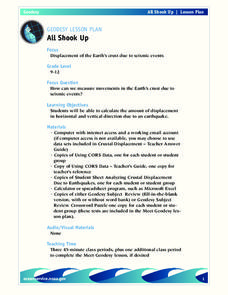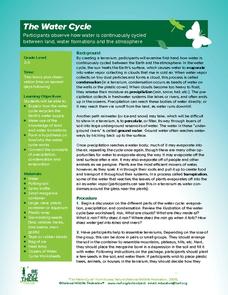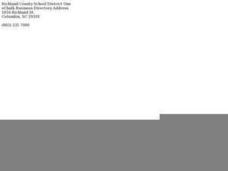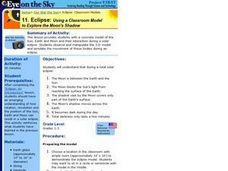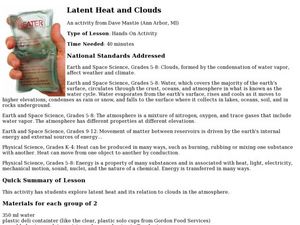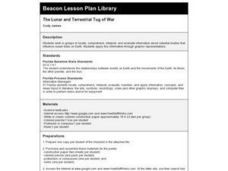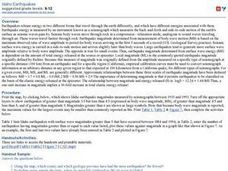Curated OER
All Shook Up
High schoolers measure movements in the Earth's crust due to seismic activity. Students calculate the amount of displacement in horizontal and vertical direction due to an earthquake.
Curated OER
The Water Cycle
Students are introduced to the components and importance of the water cycle. They are shown how groundwater moves using a model. Students list 9 places on earth where water is found. They define the terms cycle and water cycle.
Curated OER
Ancient Sun Models of the World
Young scholars explain that many different cultures across the world developed their own reasoning for the weather around them. They explore the different cultural beliefs of the sun's cycle and to create their own story of the sun's...
Curated OER
The Moving Continents from Pangaea to the Future
Eighth graders examine how the movements of the Earth contribute to fossil distribution. In this fossils lesson students make maps of the placement of the continents.
Curated OER
Musical Plates
Pupils receive current data on the movement of plates on the earth's crust. These plates shift and the magnitude of their shift over time can be tracked. They track this velocity vector on a global map and determine the speed of the...
Curated OER
Geography and Its Five Themes
Geography is not limited to just learning about the Earth and its physical features.
Curated OER
The Water Cycle
Seventh graders discover how water circulates through the earth and its atmosphere while determine how much of the Earth's water is suitable for drinking. They discover the meaning of evaporation, transpiration, and precipitation and...
Curated OER
Celebrating the Solstice and Equinox
Fourth graders graph the number of daylight hors throughout the year and examine why day length varies. They discover that seasonal changes and latitude on Earth affect the number of hours of daylight in each day. Students listen to...
Curated OER
Shaping the Land
In this shaping the land activity, students will match 7 vocabulary words relating to the movement of sediments to its definition. Students will read 10 statements about how water and glaciers impact sediment movement and answer true or...
Curated OER
Eclipse: Using a Classroom Model to Explore the Moon's Shadow
Students manipulate and observe a 3-D model which simulates the activity of the Sun, Earth and Moon during a solar eclipse.
Curated OER
Global Winds
Students extend their understanding of convection to consider global winds and the effect of the earth's rotation on the creation of patterns of prevailing wind direction.
Curated OER
Latent Heat and Clouds
Students explore latent heat and how it relates to clouds in the atmosphere. In this earth science lesson students investigate how clouds are formed. Students examine clouds and the water cycle.
Curated OER
Astronomy
Students explore the rotation of the Earth and observe the shapes of constellations. After discussing how the Earth moves. volunteers use a flashlight and globe to model the movement of the sun-Earth system. Using Digitalis technology,...
Curated OER
The Lunar and Terrestrial Tug of War
Fourth graders, in groups, locate, comprehend, interpret, and evaluate information about celestial bodies that influence ocean tides on Earth. They apply this information through graphic representations.
Curated OER
Tides and How Creatures Survive
Students discover tidal pools. In this oceanographic lesson, students observe the tides of the earth and the creatures that inhabit the intertidal zones. Students role-play the tidal zones by portraying themselves as animals...
Curated OER
Our Water Resources
Students build a model aquifer to study groundwater zones and water table formation. Students use the models to measure the movement of polluted groundwater.
Curated OER
Plate Tectonics Boundaries
Students discover how to create a model of tectonic plates and study the interactions of these plates as they slowly move on the asthenosphere. They see and experience what happens at each type of plate boundary and why there are certain...
Curated OER
Blowin' In The Wind
Students predict and hypothesize the reasons for wind movement. After viewing a video, they describe the effects of a high and low pressure system and what makes the wind blow. In groups, they construct instruments that measure air...
Curated OER
Pushes and Pulls
Students recognize different types of movement and causes that my affect the movement. They know that pushes and pulls are types of forces.
Curated OER
The Physical Geography of Australia, Oceania, and Antarctica
Students access information from the United States Geological Survey's Web site This Dynamic Earth to research the Ring of Fire. They answer four questions and then apply what they have learned to create a bulletin board display.
Curated OER
Our Amazing Skeleton
Students study the skeleton, about the number of and types of bones in the body, and how outer space affects astronauts' bones. They discover how to take care of their bones here on Earth to prevent osteoporosis, or, weakening of the...
Curated OER
The Moon
Students explore the relationship between the earth, sun, and moon in our solar system. They create a moonrise/moonset chart, perform a dance that models the moon phases, and create a Styrofoam model of the moon's surface.
Curated OER
Seafloor Block Model
Students construct a 3-D block model of the ocean floor to study fundamental earth processes. This is a preconstructed cut out that allows the students to put it together but then to add their own colors as well. There is an evaluation...
Curated OER
Idaho Earthquakes
Students examine the types of earthquakes that occur in Idaho. In groups, they compare and contrast the types of energy released and how they affect the movement of the Earth. To end the lesson, they analyze a map showing the magnitudes...
